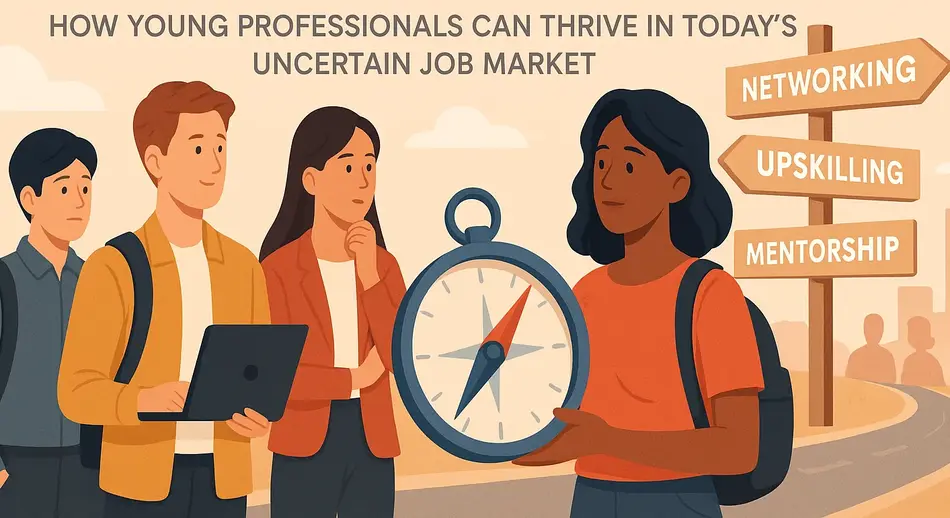Understanding the Modern Career Landscape: A New Reality for Gen Z
In today’s rapidly evolving professional world, career navigation strategies have never been more crucial—or more complex. Young professionals entering the workforce face unprecedented challenges: technological disruption, shifting industry landscapes, and the looming transformation of entire job categories through artificial intelligence.
The traditional career paths that guided previous generations have largely disappeared. As the transcript speaker notes, “Being a young person today and navigating a career, this is not an easy time to be doing this.” This understatement highlights why developing effective career navigation strategies has become essential for professional survival and success.
What makes this particularly challenging is the generational knowledge gap. Parents and mentors who genuinely want to help may lack understanding of the current reality. As the speaker explains, “People like myself and/or your parents—we may not have a clue about what is actually going to be transpiring in the world over the coming years and decades.” This disconnect means young professionals must develop career navigation strategies that acknowledge both timeless principles and emerging realities.
Hiring Adaptable Young Talent?
Find professionals who value strategic career growth, adaptability, and can deliver impact from day one—only on WhatJobs.
Post a Job Now →Adaptability: The Foundation of Effective Career Navigation
Embracing Fluidity in Career Planning
Perhaps the most fundamental of all career navigation strategies is cultivating adaptability. The speaker emphasizes this point: “Adaptability and the ability to see where things are, accept them, and see where they’re going is going to be one of your biggest skills.”
This adaptability manifests in several key ways:
- Remaining open to career paths that may not yet exist
- Continuously reassessing industry trends and opportunities
- Developing transferable skills that transcend specific roles
- Viewing career development as an evolving journey rather than a fixed destination
Traditional career navigation strategies often emphasized finding a stable industry and climbing a predictable ladder. Today’s reality demands a more fluid approach—one that values horizontal growth, cross-disciplinary experience, and the ability to pivot when circumstances change.
Focusing on Skill Development Over Job Titles
Another critical shift in career navigation strategies involves prioritizing skill acquisition over specific positions or titles. The speaker advises, “It’s about staying fluid and not staying fixed to an idea and to be working on skill sets and personal growth always as opposed to just staying [static].”
This approach recognizes that in a rapidly changing economy, the specific skills you develop often matter more than your formal role or industry. Effective skill-focused career navigation strategies include:
- Identifying emerging capabilities with long-term value
- Developing both technical and human-centered skills
- Seeking opportunities to apply new skills in practical contexts
- Building a portfolio of work that demonstrates your capabilities
- Regularly assessing which skills are becoming more or less valuable in your field
Strategic Onboarding: Making an Impact in Your First Role
The CEO Mindset: Observation Before Action
One of the most overlooked career navigation strategies involves how you approach your first job or role in a new organization. Rather than immediately trying to make your mark through dramatic changes, the speaker recommends a more strategic approach: “When you get that first job, get into that office or whatever that work environment is and you sort of lay low and you figure out who’s who in the zoo.”
This observation-first strategy mirrors how effective executives operate: “This is actually what CEOs do when they first come into when a CEO first comes into a company. They don’t come in and make a whole bunch of different changes to things. They study it first.”
Effective onboarding career navigation strategies include:
- Mapping the formal and informal power structures
- Understanding the organizational culture and unwritten rules
- Identifying key stakeholders and their priorities
- Learning the history behind current processes and decisions
Making Your Supervisor’s Life Easier
Perhaps the most practical of all career navigation strategies for early-career professionals is focusing on your immediate supervisor’s needs. The speaker emphasizes this repeatedly: “Biggest thing you can bring to any environment right now is to make your immediate supervisor’s life easier. They’re probably overworked. They’re probably stressed.”
This approach creates a virtuous cycle that accelerates your professional development:
- You take tasks off your supervisor’s plate
- You execute those tasks effectively
- You earn trust and are given more responsibility
- You gain exposure to more interesting and challenging work
- You develop new skills and expand your professional network
The speaker notes that this strategy requires patience and humility: “Some of those first things may feel like things that are beneath you or not things that you’re interested in… but if you do them and you do them well, you will then get things that you’re interested in.”
Self-Discovery Through Professional Experience
Learning What You’re Not (Yet) Good At
One of the most valuable aspects of early career experiences is how they help you understand your strengths and weaknesses. The speaker frames this as a journey of self-discovery: “You’re not really going to know what you like or what you’re good at or what your strengths are. In fact, you’re going to discover when you’re young a lot of the time what your strengths are not.”
This perspective transforms early career setbacks into valuable data points—information that helps refine your career navigation strategies. When you encounter areas where you struggle, you face an important strategic choice:
- Invest time and energy to develop in that area
- Recognize it as outside your core strengths and focus elsewhere
- Find complementary team members who excel where you struggle
Reframing Failure as Information
Another powerful shift in career navigation strategies involves how you interpret setbacks. The speaker emphasizes, “You will have failures and that does not mean that you are a failure. It means that this particular thing didn’t work out. Learn from it.”
This growth mindset approach to professional development helps you:
- Extract valuable lessons from every experience
- Maintain resilience through inevitable challenges
- Make more informed decisions about future opportunities
- Develop the emotional intelligence to separate performance from identity
- Build authentic confidence based on self-awareness rather than bravado
Building Trust Through Relationship Development
The Fundamental Importance of Human Connection
Despite technological disruption, the speaker emphasizes that human connection remains at the core of effective career navigation strategies: “Human interaction and those physical things and stuff that actually can’t be taken on by AI is actually going to be something that’s even more important.”
This insight suggests that young professionals should prioritize:
- Developing strong interpersonal communication skills
- Building authentic professional relationships
- Demonstrating reliability and follow-through
- Creating trust through consistent performance
The Art of Professional Self-Advocacy
The speaker reframes “sales” in a professional context as essentially about building trust: “When I say sales, I mean selling yourself, which is about convincing people. It’s about trust. It’s about building trust and relationships with people.”
Effective self-advocacy as part of your career navigation strategies involves:
- Clearly articulating the value you bring to projects and teams
- Documenting your contributions and achievements
- Communicating your career aspirations to decision-makers
- Demonstrating how your goals align with organizational needs
- Building a reputation as someone who delivers on promises
FAQ: Career Navigation Strategies
What are the most important career navigation strategies for young professionals entering today’s job market?
The most critical career navigation strategies for today’s young professionals include developing adaptability as a core competency, prioritizing skill development over specific job titles, and building strong relationships with supervisors and colleagues. Unlike previous generations who could follow established career paths, today’s professionals must remain flexible and continuously reassess their direction as industries and roles evolve. Practical steps include seeking varied experiences that build transferable skills, developing both technical and interpersonal capabilities, and approaching each role with a learning mindset rather than viewing it as a permanent destination. This adaptable approach allows you to respond effectively to technological disruption and changing market demands.
How should I approach my first professional role as part of my career navigation strategies?
When implementing career navigation strategies in your first professional role, adopt what the speaker calls a “CEO mindset”—observe before acting. Take time to understand the organizational culture, power structures, and unwritten rules before attempting to make significant changes or suggestions. Focus specifically on making your immediate supervisor’s life easier by taking tasks off their plate and executing them effectively. This builds trust and creates opportunities for greater responsibility. Accept that some initial assignments may feel beneath your capabilities, but recognize that proving yourself on these tasks opens doors to more interesting work. This strategic patience demonstrates professional maturity and accelerates your development far more effectively than demanding immediate high-profile assignments.
How do career navigation strategies need to adapt in response to artificial intelligence and automation?
Effective career navigation strategies in the age of AI require focusing on distinctly human capabilities while also developing technological literacy. As routine and analytical tasks become increasingly automated, skills like emotional intelligence, creative problem-solving, ethical judgment, and interpersonal communication become more valuable. Young professionals should develop a working understanding of AI tools relevant to their field while simultaneously deepening their uniquely human capabilities. This dual approach—embracing technology while emphasizing human connection—creates career resilience regardless of how AI develops. Remember that even as technology transforms industries, the fundamental human skills of building trust, demonstrating reliability, and understanding others’ needs remain essential to professional success.
How can I turn early career setbacks into valuable learning experiences for my career navigation strategies?
Incorporating setbacks into your career navigation strategies requires reframing failure as information rather than identity. When you encounter areas where you struggle, use these experiences to make strategic decisions about skill development. Ask yourself whether this is an area where investment will yield significant returns, or if your energy might be better directed elsewhere. Document specific lessons from each setback, identify patterns across different experiences, and adjust your approach accordingly. Remember that early career is primarily about self-discovery—learning what energizes you, what environments bring out your best work, and where your natural strengths lie. By viewing challenges through this lens of self-knowledge, you transform disappointments into valuable data points that refine your professional direction.






